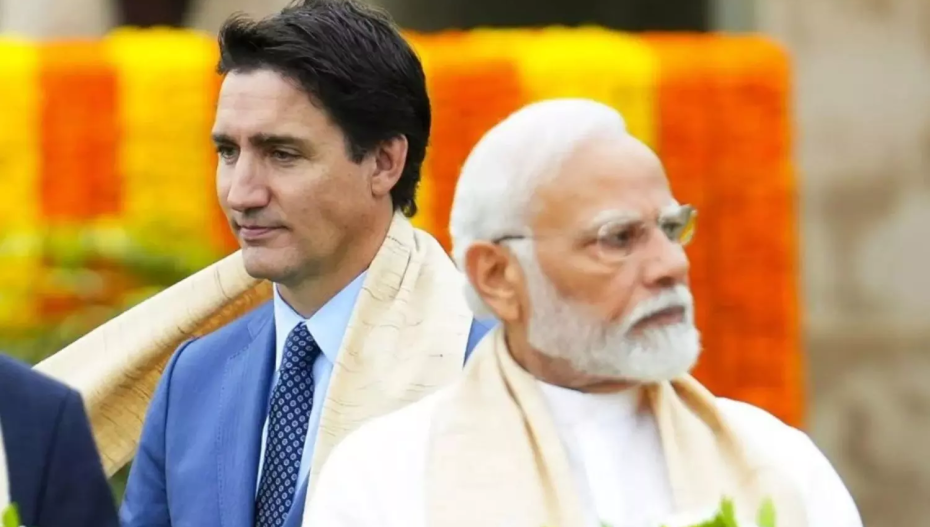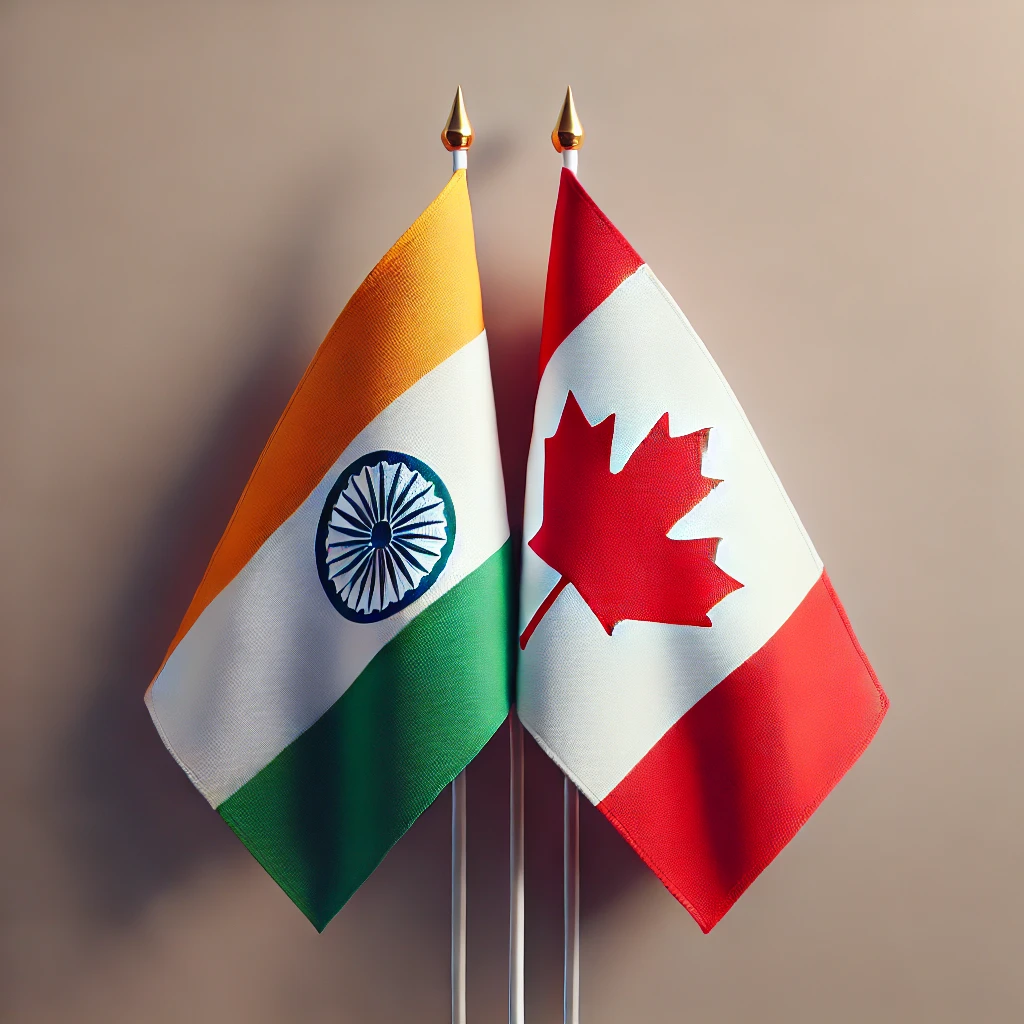Tensions between India and Canada have sharply intensified following the murder of Hardeep Singh Nijjar, a Sikh separatist leader, in Canada. This incident has sparked a significant diplomatic crisis, marked by mutual expulsions of diplomats and heated political exchanges.
Context of the Conflict

At the center of the controversy is Canadian Prime Minister Justin Trudeau’s assertion of “credible allegations” linking Indian diplomats to Nijjar’s assassination. Nijjar, a proponent of the Khalistan movement—aimed at establishing a separate Sikh state—was already under scrutiny from Indian authorities for his extremist views and actions. His death in 2023 has provoked anger among segments of Canada’s Sikh community, particularly those sympathetic to Khalistani ideologies.
Trudeau’s Serious Accusation
Trudeau’s accusation against India represents the most direct charge in the long-standing tensions between the two nations. He claims that Canadian intelligence, including the Royal Canadian Mounted Police (RCMP), has evidence implicating Indian agents in Nijjar’s murder. Following this statement, Canada expelled a senior Indian diplomat, prompting India to take reciprocal action.
The Canadian government has framed these expulsions as necessary for safeguarding its citizens and sovereignty. However, this narrative raises questions about the motivations behind such bold allegations, especially considering India’s consistent stance against terrorism and separatism.
India’s Firm Rejection
India’s response has been both swift and resolute. The Ministry of External Affairs (MEA) has categorically rejected Trudeau’s allegations as “preposterous,” arguing that the Canadian government is engaging in political maneuvering to curry favor with Canada’s substantial Sikh population ahead of upcoming elections. India’s government views these allegations as an attempt to distract from domestic issues and to polarize the electorate.
In addition to summoning the Canadian envoy, India recalled its High Commissioner from Canada, signaling a significant downturn in relations that had previously been stable despite existing differences.
Khalistan and Canada’s Sikh Diaspora
The Khalistan movement remains a contentious issue in India-Canada relations. With one of the largest Sikh diasporas globally, Canada has seen some factions supporting Khalistan, which India considers a threat to its national integrity. Indian officials have long expressed concern over Canada’s perceived leniency toward pro-Khalistan elements, which they argue fosters anti-India sentiments and promotes secessionist ideologies.
Nijjar was a prominent figure in this movement and had been designated a terrorist by India. The Indian government maintains that Canada has allowed extremists to operate freely, undermining India’s sovereignty and security.
Diplomatic Fallout and Broader Implications
The current diplomatic standoff represents one of the most serious crises in recent India-Canada history. The reciprocal expulsion of diplomats raises the specter of a freeze not only in political but also economic and cultural relations. India’s strong stance reflects its commitment to protecting its sovereignty and resisting external interference.
The situation has caught the attention of global powers, especially the United States, which maintains robust ties with both nations. While the U.S. has refrained from taking sides, it has expressed concern over the escalating tensions. Analysts suggest that Canada’s international standing could be jeopardized if it fails to substantiate its claims against India with credible evidence.
Conclusion
The ongoing crisis between India and Canada highlights a complex interplay of national sovereignty and democratic principles. While Trudeau’s government stands by its allegations, India’s firm rejection underscores its commitment to defending its interests against unwarranted external accusations. The diplomatic spat, characterized by the expulsion of diplomats and escalating rhetoric, indicates that the freeze in relations may persist.
The international community is closely monitoring how both nations navigate this delicate situation. For India, this episode is fundamentally about upholding its sovereignty against foreign interference. As both countries take firm positions, the ramifications of this standoff could resonate for years to come, shaping the future of India-Canada relations.
Frequently Asked Questions (FAQ)
1. What sparked the recent tensions between India and Canada?
Tensions escalated after Canadian Prime Minister Justin Trudeau accused India of involvement in the assassination of Sikh separatist Hardeep Singh Nijjar, which India denied, calling the claims politically motivated.
2. Who was Hardeep Singh Nijjar?
Nijjar was a prominent figure in the Khalistan movement advocating for a separate Sikh state in India and had been designated a terrorist by Indian authorities.
3. What did Trudeau accuse India of?
Trudeau claimed there were credible allegations linking Indian diplomats to Nijjar’s killing.
4. How did India respond to Trudeau’s accusations?
India rejected the accusations as unfounded and politically motivated, with its Ministry of External Affairs calling them “preposterous.”
5. What actions have both countries taken in response to the crisis?
Both countries have expelled diplomats from each other, with India recalling its High Commissioner from Canada and Canada expelling an Indian diplomat.
6. What is the Khalistan movement?
The Khalistan movement advocates for a separate Sikh state in India and has been a longstanding issue affecting India-Canada relations.
7. Why does India consider these accusations politically motivated?
India believes the accusations are aimed at gaining political favor among the Sikh community in Canada, particularly ahead of elections.
8. What is India’s stance on its sovereignty in this conflict?
India firmly defends its sovereignty and national interests against external accusations, emphasizing it will not tolerate unfounded claims.
9. What could be the impact of this diplomatic crisis on Indian expatriates in Canada?
There are concerns that the political climate may lead to increased scrutiny and hostility towards the Indian community in Canada.
10. How has the Canadian government responded to India’s actions?
The Canadian government has maintained its stance, insisting on the validity of its claims against India and asserting it has evidence linking Indian diplomats to Nijjar’s assassination.
11. What are the potential consequences for Canada due to these tensions?
The tensions could lead to a deterioration of diplomatic relations, affecting trade and cooperation between the two countries.
12. What role does the Indian diaspora play in this situation?
The Indian diaspora can influence public opinion and politics in Canada, generally seeking to promote positive relations between the two countries.
13. How has the situation evolved since Nijjar’s assassination?
Since Nijjar’s assassination, both nations have taken drastic diplomatic measures, including expelling diplomats and issuing strong statements.
14. What is the future of India-Canada relations?
The future will depend on how both countries navigate the current crisis and address underlying issues through constructive dialogue.
15. What evidence does Canada claim to have against India?
While specific evidence has not been publicly disclosed, Canadian authorities claim to possess intelligence implicating Indian government agents in Nijjar’s murder.
16. How does India view its actions in this diplomatic crisis?
India sees its actions, including recalling its High Commissioner, as necessary steps to uphold its dignity and respond to unjust accusations.
17. What implications could this situation have for international relations?
The crisis could impact India’s relationships with other countries that are allies of Canada, necessitating careful navigation.
18. What is the significance of Nijjar’s murder for India-Canada relations?
Nijjar’s murder highlights the ongoing struggle between India’s efforts to combat separatist movements and Canada’s approach to handling such groups within its territory.
19. Could this crisis lead to long-term changes in diplomatic relations?
Yes, the crisis may result in long-term alterations in how both countries engage diplomatically, potentially affecting bilateral agreements and trade relations.
20. How does this conflict affect global perceptions of both countries?
The conflict can affect global perceptions, portraying India as authoritarian in its overseas operations while Canada may be viewed as unable to protect its citizens from foreign interference.



